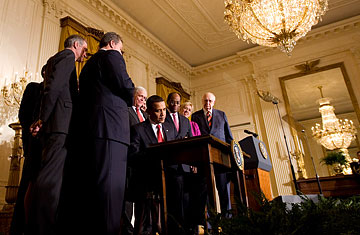
President Barack Obama, surrounded by members of the President's Economic Recovery Advisory Board, signs an executive order in the East Room of the White House in Washington
Will Barack Obama's second fortnight turn out to be rockier than his first?
Given what's about to unfold, a smooth ride would be nothing short of heroic. The President has to push his $800 billion stimulus measure through a potentially ornery House-Senate conference, firm up support for a wildly unpopular financial reform package known as TARP 2, and find a replacement for Tom Daschle, who took himself out of the running for health care czar last week amid revelations of unpaid taxes.
But let's not forget that Obama's first few weeks weren't any more uncertain than some other maiden voyages we’ve seen. George Herbert Walker Bush's initial days in office were marked more by symbolism than substance — he was hardly trying to execute any fancy dives. Bill Clinton's first two weeks — studded by a needless political explosion about gays in the military and its own share of household employee miscalculations — made Obama's seem wildly successful. (See how the world is cashing in on Obama.)
I'm reminded now of the prediction one hard-nosed political veteran had for the Clintons after those first ugly weeks had passed in early 1993. "They'll learn," Barbara Bush told friends, watching the chaos from the safety of a new house in Houston.
So will Team Obama. But we also know from the last two presidencies that commanders in chief who try to govern only from their bases can come to regret it. (See the figures from the Bush Administration that TIME will miss.)
Which is why Obama's decision to let the House Democrats draft the stimulus measure that underwent emergency surgery in the Senate last week was so interesting and could turn out to be so pivotal. Obama may have believed he had plenty of reasons to let House Speaker Nancy Pelosi run the stimulus show: his own aides lacked the time and knowledge to draft a cogent measure; he surely recalled how Clinton ran aground when he tried to force the details of an initial package down the throats of lawmakers 16 years ago; and most of all because the White House believed speed mattered more than the details.
The question now is what Obama and his team learn from this experience. As he tries to maintain the consensus for another bank bailout, entitlement reform and perhaps health care reform, will he build his legislative coalitions from the left, as he did with the stimulus? Or construct them more with a centrist audience in mind?
Clinton leaned heavily on his left flank early in his term and soon discovered no one else was following him. Bush clung to his base from the start — and never budged. (Both men were re-elected; Clinton by moving to the middle; Bush by refusing to do so.) I doubt either man would repeat their strategy if they could do it all over again. While there aren't many centrist votes in Congress to build anything around anymore, there are legislative proposals that moderate voters will appreciate.
Which path will Barack Obama follow? The next few weeks may provide some hints.
Meantime, one more thing: it's been noted widely that, even with a sketchy start, Obama is still far ahead of the game here, having won from both houses of Congress the makings of a massive stimulus measure in record time.
And that's true. But lawmakers are never much stressed when they are asked to spend money. They do that exceptionally well. It's when they are asked to cut programs and benefits that Capitol Hill really melts down. And in the health care reform, entitlement reform and energy measures still to come — giveaways like those in the stimulus package won't be on the agenda very often.
